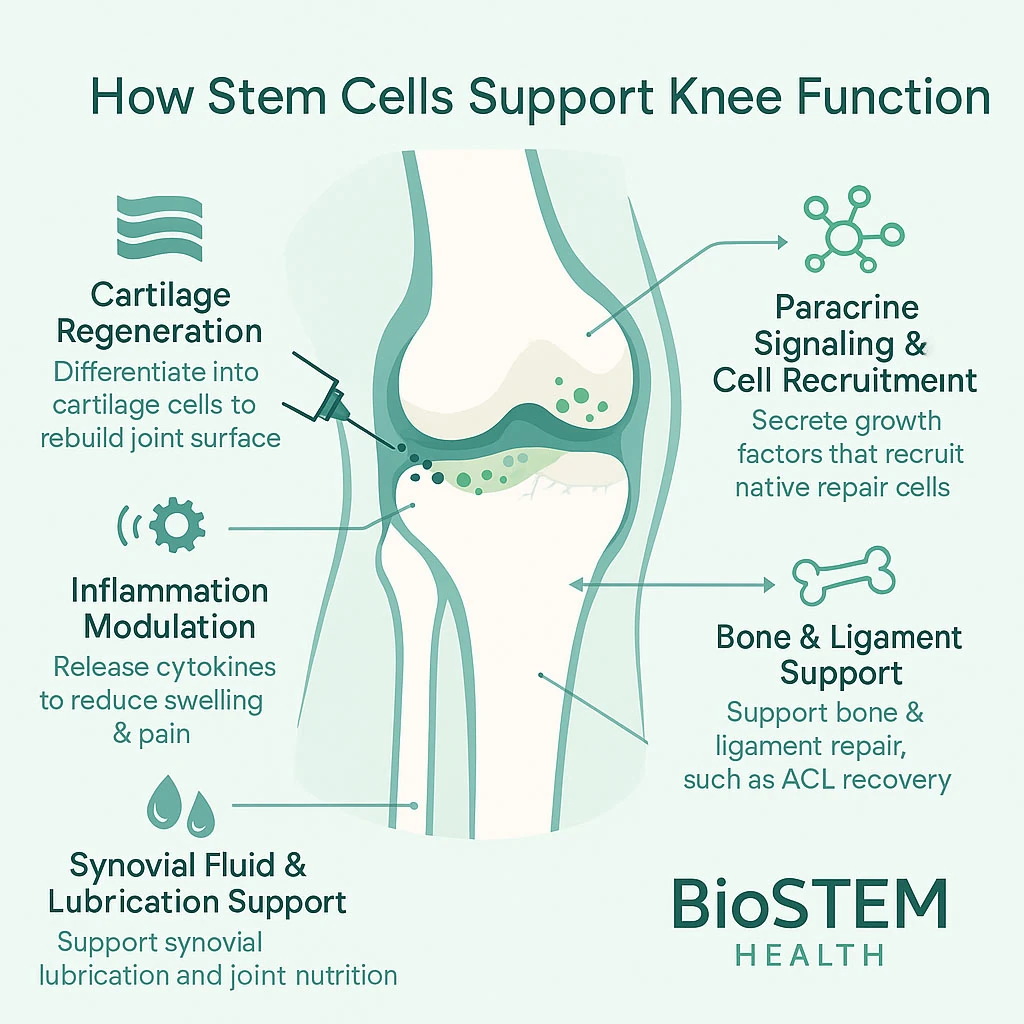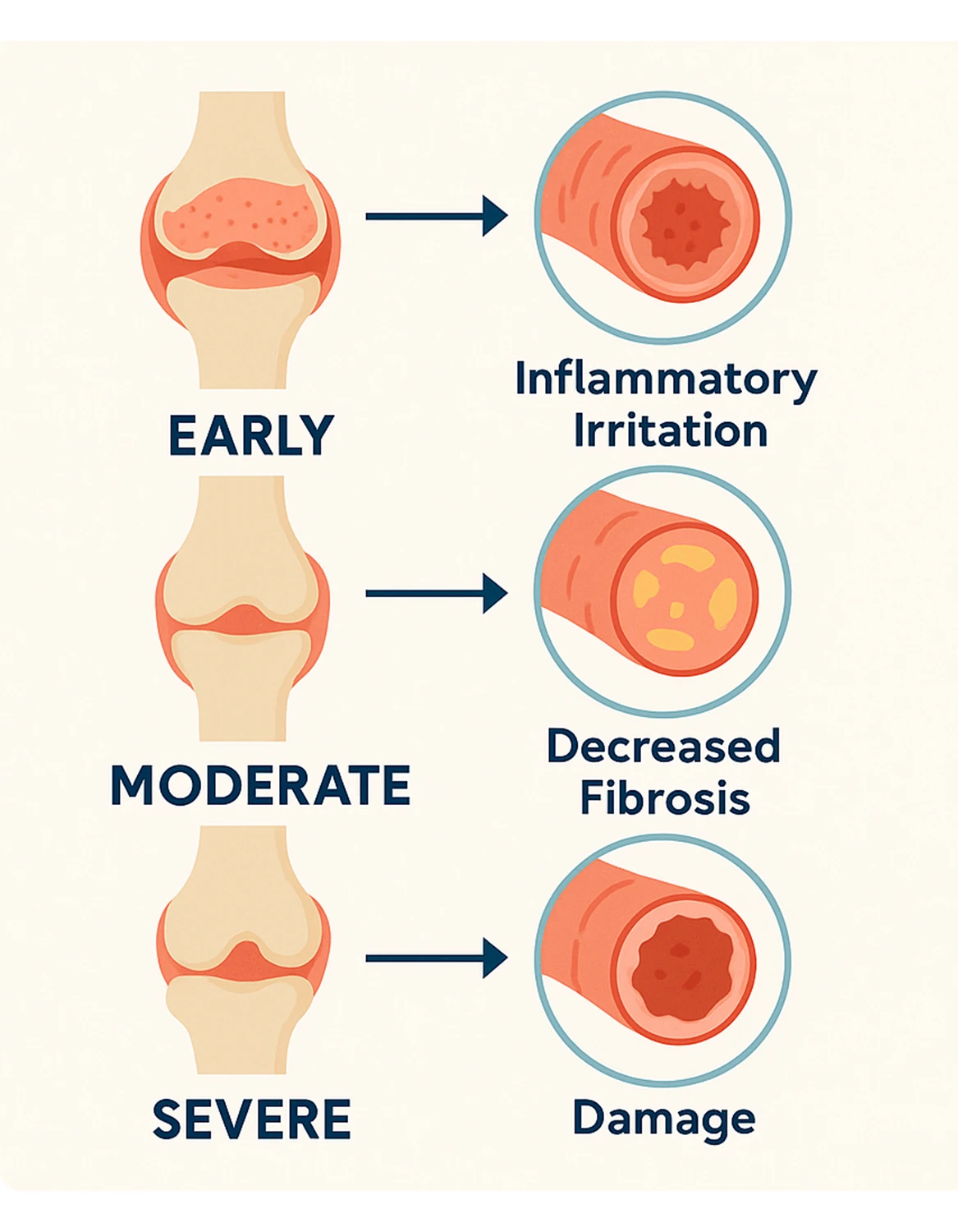Orthopedic
Stem Cell Treatment
Finding Relief from Knee Pain: Understanding Stem Cell Therapy for Your Knees
If persistent knee pain or osteoarthritis has been limiting your daily activities, you might consider exploring stem cell therapy for knees, a regenerative treatment designed to reduce inflammation, alleviate pain, and restore mobility. This treatment addresses various knee conditions including osteoarthritis, meniscus tears, ligament injuries, cartilage damage, and chronic inflammation.
Clinical studies show that many patients experience significant improvements in pain and function, with some research reporting 60-70% improvement rates. Unlike treatments that only mask symptoms temporarily, stem cell therapy works at the cellular level to support your body's natural repair processes. In this comprehensive guide, we'll explore the science behind this treatment, what to expect during the process, and help you understand if this regenerative approach could be the key to reclaiming the active life you've been missing.
What Is Stem Cell Therapy for Knees?
Stem cells function as your body's cellular reserve system. Unlike specialized cells that perform one specific job, stem cells remain undifferentiated until needed, then transform into whatever cell type your body requires. This remarkable ability makes them particularly valuable for treating joint damage.
In knee stem cell therapy, we use carefully screened donor cells (mesenchymal stem cells) that have been extensively tested for safety and potency. When injected into damaged knee tissue along with platelet-rich plasma (PRP), these cells respond to chemical signals from injured areas. They can develop into cartilage cells, release anti-inflammatory compounds, and recruit other healing factors to the site. The process amplifies your body's existing repair mechanisms in the exact location where healing is needed most.

The Natural Decline of Your Body's Repair System
Research shows that by age 35, you've lost approximately 5–10% of your original stem cell count. By age 50, you've lost around 30–50%. By age 70, you've lost about 70–90% of your original stem cell capacity. This steady decline parallels the increasing difficulty many people experience with healing and recovery as they age.
This helps explain why injuries that healed quickly in your twenties can become long-term problems in your fifties. Your younger self had abundant cellular resources to address any damage. Your older self has significantly fewer healing cells available, which often means incomplete healing and persistent pain.
The progressive loss of stem cells has a direct effect on knee joint health. Cartilage, the smooth tissue cushioning your knee joint, has limited blood supply and depends heavily on stem cells for maintenance and repair. When stem cell numbers drop too low, everyday wear and tear begins accumulating faster than your body can address it.

The Science of Stem Cell Therapy for Knee Pain
When stem cells are injected into your damaged knee, they immediately go to work through a sophisticated healing process. First, these cells detect inflammation in your joint through special chemical messengers that damaged tissue releases. This allows them to identify exactly where repairs are needed.
The stem cells then begin producing healing proteins called growth factors. Here's what each one does for your knee:
Healing Proteins Released by Stem Cells
Complete Treatment Experience: What to Expect
The entire stem cell therapy procedure takes approximately 60-90 minutes from start to finish. Unlike procedures that harvest cells from your own body, our approach uses pre-screened donor cells, eliminating the need for extraction and processing time.
What to Expect During Your Stem Cell Injection
Since we use donor mesenchymal stem cells, you won't experience the discomfort associated with bone marrow or fat tissue harvesting. The treatment involves a single injection into your knee joint. Most patients describe the sensation as similar to a standard injection - a brief pinch followed by mild pressure. Local anesthetic makes the procedure very comfortable.

The Steps Involved in Your Stem Cell Procedure
Here's exactly what happens during your treatment:
- Pre-treatment preparation: Medical team reviews your imaging and prepares the treatment area
- Local anesthetic: Numbing medication applied to ensure comfort during injection
- Stem cell preparation: 50 million mesenchymal stem cells combined with PRP prepared for injection
- Injection: Using ultrasound or fluoroscopic guidance, stem cells are precisely delivered into the knee joint
- Post-injection care: Brief monitoring period to ensure you're comfortable before going home
To enhance results, we complement the stem cell treatment with:
- Customized physiotherapy protocols
- Nutritional supplementation guidance
- Lifestyle modification recommendations
- Follow-up monitoring and support
Recovery and Post-Treatment Care
Your recovery begins immediately after treatment. Here's what to expect:
First 48-72 hours: Some swelling and warmth in the knee is normal as your body responds to the stem cells. This actually indicates the healing process has begun. Rest is important, but gentle movement is encouraged.
First week: Avoid anti-inflammatory medications as they can interfere with the stem cells' work. Ice can be applied for comfort. Most patients return to light daily activities within 2-3 days.
Weeks 2-4: Physical therapy typically begins, focusing on range of motion and gentle strengthening. The initial inflammation subsides, and many patients notice early improvements in comfort.
Months 1-6: This is when the real healing occurs. Stem cells continue working to repair tissue, with most patients experiencing progressive improvement throughout this period. Peak benefits often appear between months 3-6.
Investment and What's Included
Complete Treatment Package: USD$3,000 to USD$3,500
Your investment covers:
- Initial medical consultation and evaluation
- 50 million mesenchymal stem cells plus PRP
- MRI imaging and analysis
- The injection procedure with imaging guidance
- All medical supplies and sterile equipment
- Personalized physiotherapy program
- Nutritional supplement recommendations
- 24/7 support during recovery
Comparing Treatment Options for Knee Pain
Research on Stem Cell Therapy for Knees Success Rate
The body of scientific evidence supporting stem cell therapy for knee osteoarthritis continues to expand, with research from leading medical institutions demonstrating its therapeutic potential. Multiple clinical trials and comprehensive reviews have evaluated the safety and effectiveness of this regenerative treatment approach.
A major 2020 meta-analysis examining data from 339 patients across 9 randomized controlled trials found that stem cell therapy provided significant and lasting improvements in both pain relief and knee function, with benefits persisting for up to 24 months after treatment.
Comprehensive research published in 2021 analyzed 14 randomized trials involving over 400 patients with knee osteoarthritis. The findings showed that the majority of patients experienced meaningful improvements, with 73% of clinical measures showing positive changes after one year of treatment.
An extensive 2022 analysis that reviewed 28 clinical trials with nearly 1,500 participants demonstrated that stem cell therapy consistently improved pain scores and joint function. The research showed that patients typically begin experiencing benefits within 3 months, with improvements continuing for at least 12 months.
The latest research from 2024 comparing different treatment approaches found that stem cell therapy, particularly using adipose-derived cells, showed superior results in improving both pain and physical function when compared to other regenerative treatments.
This growing body of evidence from respected medical journals and institutions worldwide demonstrates that stem cell therapy offers a scientifically-supported treatment option for knee osteoarthritis. The consistency of positive outcomes across multiple studies, combined with the excellent safety profile, provides a strong foundation for considering this regenerative approach.
Frequently Asked Questions
What Are Stem Cell Injections for the Knee?
Stem cell injections for the knee involve placing concentrated mesenchymal stem cells directly into the knee joint to promote healing. These cells can transform into cartilage cells and release factors that reduce inflammation and repair damaged tissue.
Where Can I Get Stem Cell Treatment for Knee?
Our clinic is located at Av. Revolucion 110, Suite 4, Sayulita, Nayarit, Mexico, 63734, approximately 45 minutes from Puerto Vallarta International Airport. We specialize in regenerative treatments for knee conditions using advanced stem cell therapy protocols.
How Effective Is Stem Cell Therapy for Knee Arthritis?
Clinical studies show that stem cell therapy can significantly reduce arthritis pain and improve function, with 60-70% of patients experiencing meaningful benefits. Results typically begin within 2-3 months and can last for several years, particularly in patients with mild to moderate osteoarthritis.
Conclusion
Stem cell therapy for knees offers a treatment option that works with your body's natural healing processes. By supplementing your declining stem cell count and providing healing factors directly to damaged tissue, this approach addresses the underlying causes of knee pain rather than just managing symptoms.
The research shows positive outcomes, with many patients experiencing pain reduction and improved function. While individual results vary, the combination of scientific evidence, minimal invasiveness, and low risk makes stem cell therapy an option worth considering for those seeking alternatives to surgery or long-term medication use.
If you're interested in learning more about whether stem cell therapy is right for your knee condition, contact us to schedule a consultation to discuss your specific situation and treatment options.
Individual results may vary. No treatment outcomes are guaranteed. This information is for educational purposes only and should not replace professional medical advice. Statements not evaluated by the FDA or COFEPRIS.
Treatment
- Medical consultation
- 50 million Mesenchymal Stem Cells + PRP applied via intra-articular injection.
- MRI
- Physiotherapy recommendations
- Recommended supplement to take.
- Recommendation on things to do to enhance wellness.
